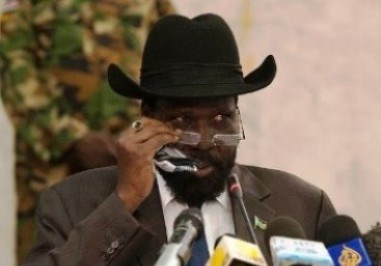S. Sudan’s Kiir warns national army against abuse of weapons
October 15, 2013 (JUBA) – South Sudan president Salva Kiir has warned members of the armed forces against misuse of weapons, saying they are for self defence and protection of the nation as well as its citizens.

The group, which was passed, had completed two years of intensive military training at Luri, about 16 miles west of the capital, Juba.
“These guns are not for me. They are not for you nor are they for anybody even the last person in this country. Their main purpose is to protect the country and the citizens against any danger from outside and protect yourself but only in self defence. Is this clear? Have you now heard the purpose of guns?” Kiir asked.
“The army can help police to enforce [the] law, ensure there is adequate security and the country is safe and peaceful from external aggression. If this is done, [then] the country will be free from crimes, such as rape, theft and robbery that we hear [of]”, he stressed.
Consequently, this can ensure the rule of law that is indispensable for economic, education, health and social development endeavours, added the president.
The South Sudanese leader further noted that progress in the country can be possible only through peace, stability, the rule of law and unity.
“Authority is granted not to be abused, but to lead the development of an institution”, he said.
SPECIAL FORCES
Several hundreds of soldiers reportedly selected mostly from indigenous youth from Warrap and Northern Bhar el Ghazal states were reportedly brought to Luri area, without the knowledge of the army’s chief of general staff, Gen. James Hoth Mai.
It was reported that Kiir, who is the commander-in-chief of the army, fell out with Gen. Mai, on the fate of the new comers, which the president wanted deployed as part of the already 3,000 presidential guards positioned in Juba.
The current 3,000 presidential guards unit in the capital is reportedly composed of the forces that used to guard president, Kiir, the former vice-president, Riek Machar, and the late Gen. Paulino Matip, although a majority of them are said to come from a single tribe.
However, the chief of staff, sources say, disagreed on the composition and selection of the new force from one community that were brought to Juba, through the office of the president.
For instance, he reportedly refused to recognize them or deploy them in Juba, claiming that the right selection process and deployment channels were not followed.
But, despite Mai’s reservations on what seemed to be a private force, the soldiers were, however, undergoing training for the last few months at Luri Bridge.
The president was, on Monday, shown on the state-owned SSTV graduating these new forces, during which he identified them as republican guards.
Gen. Mai did not, however, accompany the president to the graduation ceremony despite the fact that his presence at the event should have been the normal protocol for graduating the forces.
The absence of the army chief at graduation furthered speculations in the capital that he has maintained his refusal to recognise the force in his regular deployments as the head of the army.
OLD LIBERATION SONGS
Kiir also advised the recruits to stop singing old liberation songs, saying they were which no longer applicable to the current situation as they were composed and sung to raise moral of the former rebels during the bush war.
Meanwhile Kiir, in his remarks broadcast on SSTV, also reminded the new soldiers to maintain the sense of belonging to the whole nation and not to an individual leader.
“I urge you to stop singing some of the songs you have just sung. You are not soldiers belonging to an individual,” he told the graduation.
Maj. Gen. Marial Cinduong Yol, the commander of the presidential guard division, urged asked the recruits to respect and protect foreign nationals living the country, explaining that they were in the country to assist in development.
“They [foreigners] have come to assist us in development. Some of them are investors [and] others are experts. They should therefore be shown respect and protection they deserve with their properties”, Yol told the forces.
Those who commit crimes should be monitored and dealt with by the law by relevant institutions, which are already there, he added.
South Sudan’s military is constituted from former rebels – the Sudan People’s Liberation Army (SPLA) – who became the country’s national army after secession from neighbouring Sudan in 2011 as part of a 2005 peace deal that ended decades of conflict.
Since independence, the SPLA has on several occasions been accused of human rights violations against civilians, most notably in Jonglei state where it is fighting a rebellion and trying to prevent cattle raids between rival ethnic groups.
The army, however, denies these accusations saying its mandate is to protect citizens, not harm them as alleged.
(ST)
ST – SPLA investigating suspects over human rights abuse in Jonglei
